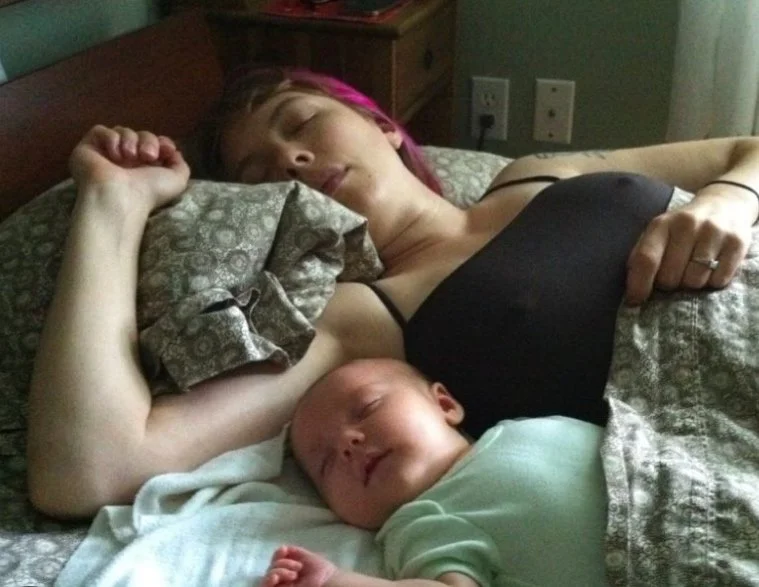Where Baby Sleeps
Where an infant sleeps is a highly personal decision made by families based on the societal and cultural norms, individual risk/benefit factors and desires.
Public agencies can only make broad recommendations without knowing your family’s particular circumstances and lifestyle. There are a variety of factors affecting a family’s decision of where and how their infant is sleeping. Like with any decision, there are risks and benefits to consider. What works for some families may may not work for others.
Doing what works for YOUR family is the most important thing when it comes to sleep. It’s so important to have all the evidenced-based information so you can make the most informed choice about where your baby sleeps.
Am I Doing This Right?
Right from the start, many parents worry that they aren’t doing things right. They worry that if they soothe and nurse their baby to sleep, or hold them while they are sleeping that they are doing something wrong and feel guilty. They feel guilty about bringing their baby into bed with them so that they can get some sleep why keeping their baby close. They worry that if they don’t do what the sleep books are telling them, that they will create bad habits and their baby will never sleep through the night. They worry that they will be judged by the pediatrician, friends and family.
If it’s so wrong, then why does it feel so right?
Something inside us is awakened when we become parents. Something that no book can teach us.
The instinct to protect, care for and nurture your baby are there to insure the survival of our species. The need to pick them up and soothe them when they cry comes from deep within us. These ancestral parenting instincts are hardwired into all mammals and are turned on when they give birth. These are strong feelings and you may be surprised by them.
Your baby has these too.
Your baby is born with feeding reflexes to start rooting for a nipple when their cheek is stroked. They can smell where the milk is and use their immature body to push and struggle lower so that they can get to it. Your baby doesn’t know that they were born in the year 2023. They have no idea what a Snoo is or that they are safe from danger. All they know is that they need to survive. Everything inside them is telling them to be on an adult body where there is food, warmth, care and protection.
So how did we get here? Why are our societal norms so at odds with our biological hardwiring?
The answer is, our culture affects how we parent and what our values are. In Western culture, specifically the United States, we have a culture that values individualism and self-reliance and we tend to parent in ways that reflect this. We also have a capitalist system and a government that doesn’t provide nearly as many benefits as other modern countries. Most modern countries have paid leave for up to 1 year after a baby is born, recognizing the benefit to society that is created when families can take time off work to bond and learn to care for their infants. The United States doesn’t provide any paid leave to new parents.
Similarly, the struggle about infant sleep largely unique to Western culture. In other cultures, and most of the world, sleeping with your baby is not considered unusual or risky. It’s actually quite normal to keep your baby close most of the time.
In Japan, families sleep together, including babies until they are pre-teens and want to have their own beds. Japan has one of the lowest rates of infant mortality in the world and THE lowest SIDS rate in the world at 0.3 in 1000 births. Japan’s government also provides income to parents for up to a year off work to bond and care for a new baby.
Sleep training is unique to Western culture.
Here’s a few snippets from a Reddit Post about what people from other cultures have to say about sleep training:
“I live in the Czech Republic, and everyone here looks at me like I'm a crazy person when I talk about sleep training my kids. Most of them have never heard of it. They're equally shocked to learn that my little ones go to bed at 6, don't wake up at all during the night, sleep for 12 hours straight and all in their own room. All the Czech people I know with kids cosleep until at least 3, if not older. A coworker of mine mentioned to me that he and his wife still share a room with his 7 and 9 year olds (bunk bed / loft situation). Another good friend of ours says she goes to bed on her own, but her 7 year old twins always come get into her bed at some point during the night. All the kids seem to stay up til like 9 - 10pm at night here, too. Whenever we go out for dinner / drinks in the evening everyone always has their kids and babies out with them, ours are the only ones asleep at home.”
“As a Pakistani we don't sleep train a baby, babies will go to sleep when they are ready to sleep. Most babies co sleep with their moms and they have help from family. For example I wanted to sleep train but my mom(Born and raised Pakistani) thought that was the most craziest idea. Where she is from babies sleep next to thier moms for easy access to breastfeed during night. Co sleeping is the norm with allowing baby to sleep on thier terms. I personally allow my baby to sleep on his terms and he does cosleep with me. I think this has created a close bond between us.”
“Hello from India! When we sleep trained our 6 mo last year, it was quite a taboo subject and I don't know any other Indian baby that's been sleep trained. Co-sleeping is seen as the norm and my parents (I'm 31,F) were quite concerned that our son slept alone in his room as a 1 year old even though we had a baby monitor. Now my son's almost 19 months and we co-sleep because it's exhausting to keep re-training and contact sleeping works for us.”
“Sleep training isn’t a thing in China either. Co-sleeping or at least rocking to sleep is super common. Lots of grandparents/relatives around to pass baby around to. Roomsharing is also very common because space is limited. My parents/in-laws don’t get the whole “toddler must sleep alone in their own room and not get up the whole night” culture in the US. We considered sleep training, but ended up always rocking my daughter and then transferring to the crib/contact sleeping if needed until she decided she wanted to sleep by herself around 11 months. Now she’s 13 months and sleeps independently. We decided if she ever needed us at night during a regression, we’d be down for cosleeping or sleeping next to her crib.”
“Just wanted to pipe in - sleep training isn't huge here in Australia. At least - I've never heard of anyone doing sleep training except maybe my SIL, and even then it was because her 1yo was still waking every 2 hours and they needed a sleep therapist to intervene. Tbh she should have sleep trained way earlier but that's neither here nor there. It's not really a big thing here I guess, they never thought of it until her return to work date was looming. We are lucky to have a good sleeper, but if we didn't it's not really a big deal - I'm 5 months into my 6 month parental leave, and then hubby is taking 6 months in January when I return to work (all paid). If she sleeps crap it doesn't matter so much.”
Even in the United States, co-sleeping is a very common, even though it’s discouraged by our society and the American Academy of Pediatrics.
“Co-sleeping is actually more common in the U.S. than most people believe. The typical American home has a room that contains a crib for the baby, and parents report that the baby sleeps in the crib. Yet when researchers ask specific questions about who sleeps where, it turns out that the majority of mothers sleep with their young children at least some of most nights. Parents present themselves as having babies who sleep alone, following the societal norm of the baby in the baby's room and the couple in the master bedroom, but that is not an accurate representation of what is really happening.
The Centers for Disease Control (CDC) in Atlanta collects data that provide information on all means of prenatal and well-baby stressors. Through this, we know that co-sleeping is not unusual for American families at all. Roughly 68% of babies enjoyed cosleeping at least some of the time. Further analyses of the data show us that about 26% of infants coslept "always" or "almost always." Combining them with the babies who co-sleep "sometimes," it appears that 44% of US babies from 2-9 months old are co-sleeping in an adult bed at any given time.” - Dr. James McKenna, PhD. Here is a paper from the CDC reflecting these statistics.
If the CDC’s percentage is accurate, and 68% of babies co-sleep some of the time, telling parents they shouldn’t co-sleep isn’t going to help parents set up sleeping spaces that are safe for babies when they do co-sleep. The AAP’s recommendation to not bed-share is reminiscent of teaching abstinence to teenagers. You can tell them not to do it, but you aren’t giving them the tools and guidelines to do it safely if they do.

